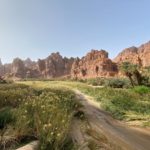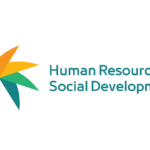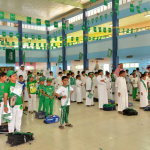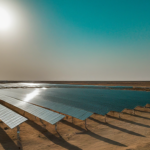
“Thousands of monumental structures built from walls of rock in Saudi Arabia are older than Egypt’s pyramids and the ancient stone circles of Britain, researchers say – making them perhaps the earliest ritual landscape ever identified.”
–Tom Metcalfe, journalist, NBC. A study published Thursday in the journal Antiquity shows that the mysterious structures dotted around the desert in northwestern Saudi Arabia – called “mustatils” from the Arabic word for “rectangle” – are about 7,000 years old. That’s much older than expected, and about 2,000 years older than either Stonehenge in England or the oldest Egyptian pyramid. [NBCNews]

“Gas flaring satellite data from 2020 reveals that Russia, Iraq, Iran, the United States, Algeria, Venezuela and Nigeria remain the top seven gas flaring countries for nine years running, since the first satellite was launched in 2012. These seven countries produce 40% of the world’s oil each year, but account for roughly two-thirds (65%) of global gas flaring.”
–Carla Sertin, reporter for Oil&Gas Middle East, on global gas flaring patterns. Gas flaring declined in 2020 by 32% due to an 8% drop in oil production and greater efforts to use the gas. [Oil&Gas Middle East]

“It makes sense for these countries to sell stakes when valuations are good. Some of it is fiscal. Some of it’s a growing recognition of the speed of the energy transition and the need to realize value from these assets.”
-Justin Alexander, chief economist at MENA Advisors, commenting on the marketing of ‘crown jewels’ as Saudi Arabia, the United Arab Emirates, Qatar, Oman and Kuwait have all accelerated multi-billion-dollar plans to sell energy assets or issue bonds off the back of them. [Bloomberg]

“Like every family, brothers do not agree 100 percent on all issues and matters. This is similar when it comes to governments…We are in agreement throughout 90 percent of the policy of President Biden and we hope to enhance it one way or another…And for the things we have some differences with them, about 10 percent, we try to neutralize the risk and reach an understanding about them. They are our partners for more than 80 years.”
–Crown Prince Mohammed bin Salman, in an interview marking the 5 year anniversary of Vision 2030 with Al Arabiya, discussing U.S.-Saudi relations. [Full Interview via YouTube]

“When I got this job in 2005, I thought maybe one day solar will supply 1% of the world’s electricity. Now it’s 3%. Our official forecast is that it will be 23% by 2050, but that’s completely underestimated.”
–Jenny Chase, head of solar analysis at BloombergNEF, speaking with Royce Kurmelovs for his article on the rapid development of solar energy which he describes as, “a story about Chinese industrial might backed by American capital, fanned by European political sensibilities and made possible largely thanks to the pioneering work of an Australian research team.” [The Guardian]

“Between now and 2025, and possibly until 2030, fiscal sustainability is a priority for us. We believe that until we achieve all the targets that Vision 2030 has set, we need to maintain fiscal sustainability and control government expenditure.”
–Mohammed Al-Jadaan, Saudi Minister of Finance, discussing the Saudi budget and plans to save close to $200 billion over the next decade by replacing oil used for domestic needs with gas and renewables. [GDNonline]

“The employment rate—the share of the labor force that has a job—of Saudi women has been steadily increasing from 68 to 76 percent between the end of 2018 and 2020; and the female unemployment rate has decreased, from 32 to 24 percent. Maybe even more importantly, this increase in employment was not driven by the government hiring Saudi women.”
-Brookings examined the significant growth since 2018 of Saudi women joining the workforce. [Brookings Institution]

“The resumption of international flights at 1 a.m. on May 17 will exclude 20 countries: Argentina, the UAE, Germany, the US, Indonesia, Ireland, Italy, Pakistan, Brazil, Portugal, the UK, Turkey, South Africa, Sweden, Switzerland, France, Lebanon, Egypt, India and Japan.”
-Saudi Arabia’s Ministry of Interior. [Arab News]

“We have a clear pipeline of transactions. We just need to set the priority for them. We now have a lot more clarity than we did two or three years ago.”
-Rayyan Nagadi, head of the National Center for Privatization, on the completion of the sale of four flour mills which raised $1.54 billion but took five years to complete. Saudi Arabia is also expected to sell part of the Ras Al Khair desalination plant later this year, which could raise several billion dollars. [Bloomberg]

“The Cabinet reiterated that it is closely following the current developments related to Iran’s nuclear program, citing the emphasis of the Kingdom of Saudi Arabia call for Iran to get involved in the current negotiations…The Cabinet underscored the importance of the international community reaching an accord with more stronger and lasting determinants embodying strict monitoring and controlling measures, to prevent Iran from acquiring the nuclear weapon and develop related essential potentials for that.”
–The Saudi Press Agency, in the state news agency’s weekly summary of the Kingdom’s cabinet meeting in which the subject of negotiations with Iran was discussed. King Salman chaired the meeting. [SPA]











